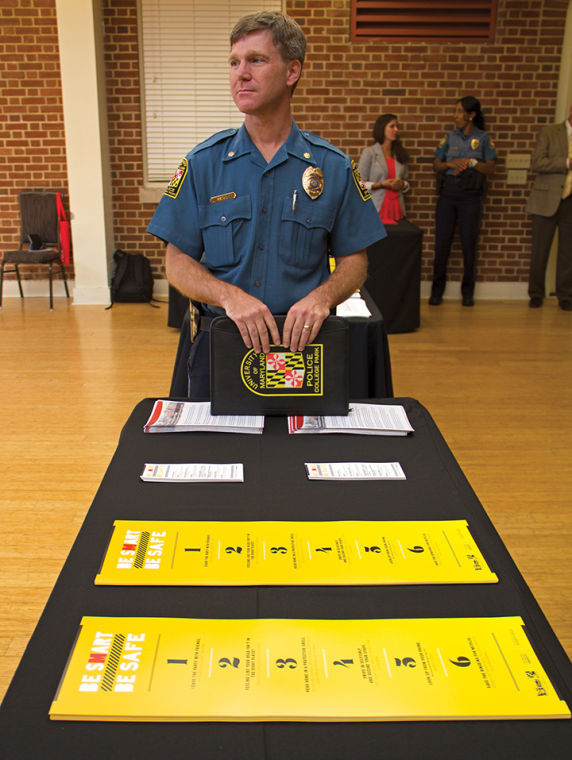
Marc limansky, former University Police spokesman, attended a Sept. 16 ceremony where officials explained the expansion of the Code of Student Conduct.
University officials implemented an expanded Code of Student Conduct in May, but during the first weeks of the fall semester, they’re still waiting to see how the changes will affect off-campus student behavior.
One month into the semester, university officials received 56 off-campus referrals to the Office of Student Conduct, which they said was an expected jump because of the new policy. But there have been a total of 97 nonacademic misconduct referrals overall between June 1 and Oct. 4, down from 116 referrals during the same period in 2012.
“[The number of referrals] has to do something with the significant outreach efforts,” said Tamara Saunders, student conduct office associate director.
Over the past two months, university officials worked to address the conduct code expansion by attending city civic association meetings, discussing it with students during “knock and talks,” emailing parents about the new policy and advertising the changes online, Saunders said.
All of the referrals this year come from a “spectrum” of violations against the code — not just underage drinking or illegal drug possession, student conduct coordinator Vanessa Taft said.
Anyone — university officials, students, police or residents — can refer an incident to the office if he or she believes a student’s actions violate the conduct code, Saunders said.
University officials then decide whether the evidence provided is “clear and convincing” to charge a student with misconduct. An administrator or the University Student Judiciary will decide the case, Taft said.
“The majority of cases, students are probably found responsible,” Saunders said.
Officials hope the expanded code will eventually foster stronger ties between the city and the university and boost the university’s reputation, Taft said. In developing plans for the expansion, Saunders said, officials looked at other University System of Maryland institutions, such as Towson University, to understand how they expanded their student conduct codes.
Despite what some students might believe, most charges incurred through the university exist on disciplinary records, not academic records, Saunders said. Usually, suspension or expulsion is the only notation placed on an academic record, she said.
“We’re not the big bad wolf,” Taft said. “We are here to educate you about your decision making.”
POLICE RESPONSE TO EXPANSION
University Police saw an 18 percent increase in the use of referring incidents to the Office of Student Conduct instead of citing or arresting a student, University Police Chief David Mitchell said.
It may be too early to tell, Mitchell said, but the trend suggests that referrals to the university will be used more often.
“University Police officers enjoy this because it’s another tool in the kit that we can use,” he said.
Overall, Mitchell said he is pleased with how the beginning of the semester has gone in terms of student safety. The expansion has also brought along further collaboration between the university and city officials, which could help with future initiatives, he said.
STUDENT OFFICIAL RESPONSE
In the long term, the code’s expansion will become a cultural change in how students behave off the campus, said Josh Ratner, Student Government Association student affairs vice president.
“As opposed to getting students in trouble, it will make them think a little more before doing something,” Ratner said.
Catherine Thompson, University Student Judiciary Executive Board chairwoman, said she has heard differing opinions regarding the expansion from students and judiciary members. But in general, she said, most seem to support the new policy.
Expanding the code places the university on the same level as many other Big Ten schools that have off-campus jurisdiction for misconduct, Thompson said.
In the end, Thompson said, the expansion allows the university to get involved in student sexual assault cases and other serious offenses.
“All that this is doing is encouraging students to be smarter about the decisions they are making,” Thompson said. “You’re a Terp wherever you go.”



